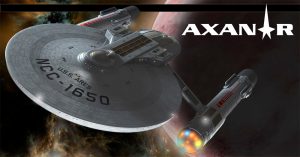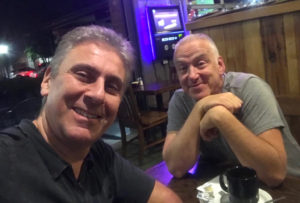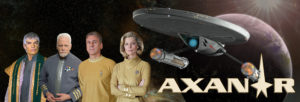 Last time, we began a fascinating discussion with PAUL JENKINS, who will be the new co-writer of Axanar. Although ALEC PETERS has already written complete drafts of the two 15-minute short fan films allowed thorough his legal settlement with CBS and Paramount, and at least ten major iterations of the full 90-minute script exist, Alec has asked Paul to come on board to help polish and finalize all three long and short scripts.
Last time, we began a fascinating discussion with PAUL JENKINS, who will be the new co-writer of Axanar. Although ALEC PETERS has already written complete drafts of the two 15-minute short fan films allowed thorough his legal settlement with CBS and Paramount, and at least ten major iterations of the full 90-minute script exist, Alec has asked Paul to come on board to help polish and finalize all three long and short scripts.
Paul himself is a very impressive writer and film producer in his own right. He is credited as one of the main reasons that Marvel Comics escaped Chapter 11 bankruptcy in the 1990s when he helped to create the “Marvel Knights” series of titles. He has written a wide range of both Marvel and DC comics characters, winning an Eisner Award and five Wizard Fan Awards. His work on Wolverine: Origin was even turned into a blockbuster feature film.
Paul has written and creative directed numerous titles for the video gaming industry, and he’s worked on projects with many of the major motion picture studios. Paul currently lives in Georgia and chairs an advisory committee to educate the Georgia General Assembly on the evolution of digital and interactive technologies. He’s also been tasked by Georgia’s governor to help cultivate and nurture the growing film development industry in the state.
And now Paul will be lending his impressive talents to Axanar.
In the first part of our interview, we learned how Paul first got involved in the project, and how the announcement of his involvement almost immediately caught the attention of Axanar detractors who contacted him with very negative and angry messages. (Seriously, guys?)
But Paul is taking it all in stride. Having been a prolific comic book writer for more than two decades, this isn’t Paul’s first rodeo. As far as he is concerned, the lawsuit has been settled, and now the job ahead is to make the next two Axanar episodes as good as they can be.
And now, back to our great interview…
JONATHAN: So now that you’re on board the project and there’s already completed drafts of both 15-minute scripts, what exactly will you be doing as co-writer?

PAUL: Let me tell you my process. I watched Prelude to Axanar, I read the full 90-minute screenplay, and I read the two 15-minute episodes. I’ve already sent Alec the first rewrites of one of the two 15-minute episodes. So I’ve actually done the iterative parts. I’ve been though with him note by note, on a long session, as to where I think the script needs some help, what I think it needs to do, what the overall impression of the script is and where I think it should be moved to, and some specifics, as well.
I believe that my input was done with, hopefully, a modicum of expertise in storytelling and a fresh eye that isn’t living inside the project, that hasn’t been through the iterative process that can sometimes be very exhausting. The worst thing in the world can be to go through development hell.
JONATHAN: Yeah, there’s certainly been a lot of that on Axanar! So is Alec just handing over the script to you with full creative freedom and saying, “Here, Paul, go fix everything…”?
PAUL: No. I said to Alec since day one, “I don’t need your creative freedom…because you’re a producer and you’re trying to make a project, and it has to be what you’ve already done, and so on. There’s already a vision for this project. What I would ask you for is a little bit of creative trust. You wouldn’t be asking me to be involved with this project and to help write it and to help build it out if you didn’t know what its background was and have some trust.”
And then the first thing I did was to demonstrate, hopefully, why I could be trusted by going through the script with him and saying, “I think this, I think that, how about this…?” and just sort of going through the whole process of where I think it could be helped and where it could be moved to and what the focuses should be.
This is what I used to do for Marvel, for example. When I worked for them, they were in Chapter 11 bankruptcy. They were going out of business. And the last resort, sometimes, of a creative corporation is to say, “Okay, tellya what. Let’s let the creatives do their thing.” And of course, that initiative—which was “Marvel Knights”—kind of rebuilt their company.
JONATHAN: So how much of your help does the script need? Is it just a little “nip and tuck” or are you doing major surgery?
PAUL: Listen, I really like what Alec has done. I read the full script, and the sense of action is great. All of those parts worked. So my participation is not some “surgery” where I just basically write and change things to drastically smash stuff up. It’s not that.
I liked the action of it. There are plenty of scenes where battlecruisers are fighting, there’s tension, and there’ stuff happening. That stuff works. I liked the sense that this battle was going on and people were moving these pieces and that stuff was happening. What I felt it lacked was that it didn’t feel like this was being done by people; it’s just a series of things that happen.
This is what I pitched to Alec, and this is why I got involved: “Alec, if you’ll permit me, the thing that I want to spend my time on is populating those core events with people. I think it’s a series of events, but I need to be able to care very much about those series of events. I need to feel the weight of Garth’s decisions because I need to see that Garth is affected by them. I need to see that he cares for his crew. I need to see personal anecdotes and stuff like that.”
It has to be meaningful and populated by people and not icons. So my primary focus is that…making sure that there’s that adherence to character. I felt that if I could bring that to it, then a lot of the rest of it would fall into place. There’s not a lot of structural changes I need to make to the action sequences.
So really, what I brought to it was a real focus on character—amongst every character, not just Garth but Alexander and Travis, Kharn, and all these other people. And I did that by pitching Alec and saying, “This is what I’d like to do. How do you feel about it?” And to his credit, he said, “Yes, that’s what I think it needs.”
 JONATHAN: So by adding in more characterization, you’ll take a good script and make it better?
JONATHAN: So by adding in more characterization, you’ll take a good script and make it better?
PAUL: I’m hopeful to take the best part of it and build on it. Because “better” is so subjective, right? People speak in absolutes. “Better.” Well, you can’t speak in absolutes because it doesn’t work that way. It’s subjective.
Instead, I ask the question: “What can we do to improve it?” And so I think you look at it with a broad base, and say that I really think that the characterization and some of the structure could be helped. And so I try to do that with a bit of humility, and I go to Alec and I pitch it to him. And I say, “Look, man, here’s what I think you’ve done—and I mean this genuinely—I think making this project and bringing it to the point that it’s at is really great. I’m sorry that you’ve been through eleven iterations, frankly, because that’s too much. It really is. It’s development hell. Let me come in with this iteration—and here’s the pitch before I write anything —this is where I’m going; these are the specifics, these are the generalities…and then, here’s the version that I’m doing. And I hope that you understand that most of it is all about character. And so far, that’s working out pretty well.
JONATHAN: I sounds like you’re very committed to this project…
PAUL: I love the idea that Axanar existed. There’s a little part of me—because I’ve always been the father figure to the bastard children of literature, whether it be comics or games or whatever—there’s a part of me that says that because CBS sued Alec, and now the settlement lets him make a fan film after all…I just feel a little bit like, “Aw, man! All he was doing was making something.” And I try to encourage that in Georgia; I’m really trying to get people to be more professional. But to really go get stuff made—and Alec went and did that, and I think everyone should admire him for that because he worked really hard to make this thing happen.
And so I’m hopeful I can help. “I’ll give you some support then, man; I’ll give you some help. And all I ask is a little bit of trust.” And so far, he’s been very trusting of me. It’s worked out great.

Fantastic interview!
Here is the wonderful thing about a script.
It can live in your head perpetually until there is money to produce it and mechanisms in place to keep that money accountable.
Oh.
Very true. Fortunately, Paul has access to a lot of film-making resources in Georgia. He was a great connection to make!
Great Interview and Paul sounds like such a wonderful breath of fresh air, after all the staleness of lawsuit, he said, she said and “screw them” all over the place. He understands what the fans have seen in ALL trek, the characters and their ongoing development. Some people really hate DS9, but it had a wonderful, continuous character development of ALL the characters, from start to finish. That was a real strength, and also is what makes for great re runs and looks again, as each time you say “I didn’t see that the first time”. I love the fact he has a simple, but seemingly fair view of the who Axanar situation, CBS sued it’s fans, and that is one of the key things that will never be forgotten by a lot of them, and has lost them a chunk of their Discovery fanbase (not to mention the whole “rinse and repaint” thing). He understands the whole “tell a story with characters” idea, which has, for me, been the whole reason to watch Sci Fi. Vance Major Owens gets that in his prolific fan films, he tries to tell a story with characters, and almost NO special effects, or even stage, beyond the basics. They are not professional grade films, but there is a sincerity in t, because it IS character driven. I am betting Paul will make the 2 shorts to be very powerful stories in themselves, and also have the support of superb production, meaning they will be excellent. That may pave the way for a larger set of fan films of really high quality, if he can pass that philosophy along to the up and coming film makers. I just hope the barbarian tribes out there in Anti Axanar land, don’t bother him too much, but he seems very capable at just saying “meh” to them and moving on. Good job Jonathan!
Thanks, Brian. Paul really was a great guy to talk to. I like him a lot, and he looks at Axanar very objectively and professionally without a lot of the emotional intensity showed by folks on both sides of the controversy. I think that help the project immensely.
Excellent CGI can be icing on the sci-fi film cake, but I couldn’t agree more with you that an excellent story well told is the cake itself.
We know from “Whom Gods Destroy” that Garth was Kirk’s inspiration (battle of Axanar being required reading at the academy and all) and in WOK Kirk says, “I’ve cheated death. I’ve tricked my way out of death and patted myself on the back for my ingenuity.” (having never faced it head on in his entire career.)
So what I want to know from Axanar is this: What made Garth into what he was that would then inspire Kirk to become what he was in TOS?
The reason I ask is that I cheat death all the time, in a slightly different way. There are no gas stations or auto club at Mars, Jupiter, or Saturn. I’ve got folks designing hardware that has to work in a harsh environment, by itself where one-way light time can be hours or longer, and (by the way) we don’t launch for another 9 years. The smallest missed detail can ‘kill’ the mission. And there are hundreds of those to find BEFORE we go. I’ve seen hardware that was as useless as a $250 M paper weight that had to get delivered in a few months but a slip-up in the design had to get remedied when there was no time to use a ‘traditional’ design approach. (And yes, we found a fix for it, but in a very non-traditional way. And that was only after a comment that someone had made 20 years before that I remembered, said it out loud, and everyone turned and said, “We’ll do that!” almost like Tim Allen said it Galaxy Quest.)
And, so, yeah, Axanar is about people, but it had better be mostly about the ONE guy that served to inspire the rest of us.
At least I hope it is . . . .
“And, so, yeah, Axanar is about people, but it had better be mostly about the ONE guy that served to inspire the rest of us.”
Well, from what I’ve seen, it’s MOSTLY about him. But it’s also about the battle itself and those whom participated at all levels, from the admirals down the yeomen. But yes, Garth is the fulcrum of the story of Axanar. The battle defined him as much as he defined the battle. I don’t think you’ll be disappointed.
So, are you working directly for NASA or a private venture or as a contractor? Just curious.
Paul adds some octain to the mix! Not that I’m not excited before, but, the light at the end of long tunnel just got a bit brighter. And thanks Jonathan for bringing such great stories to us dedicated fans.
You’re very welcome, David.